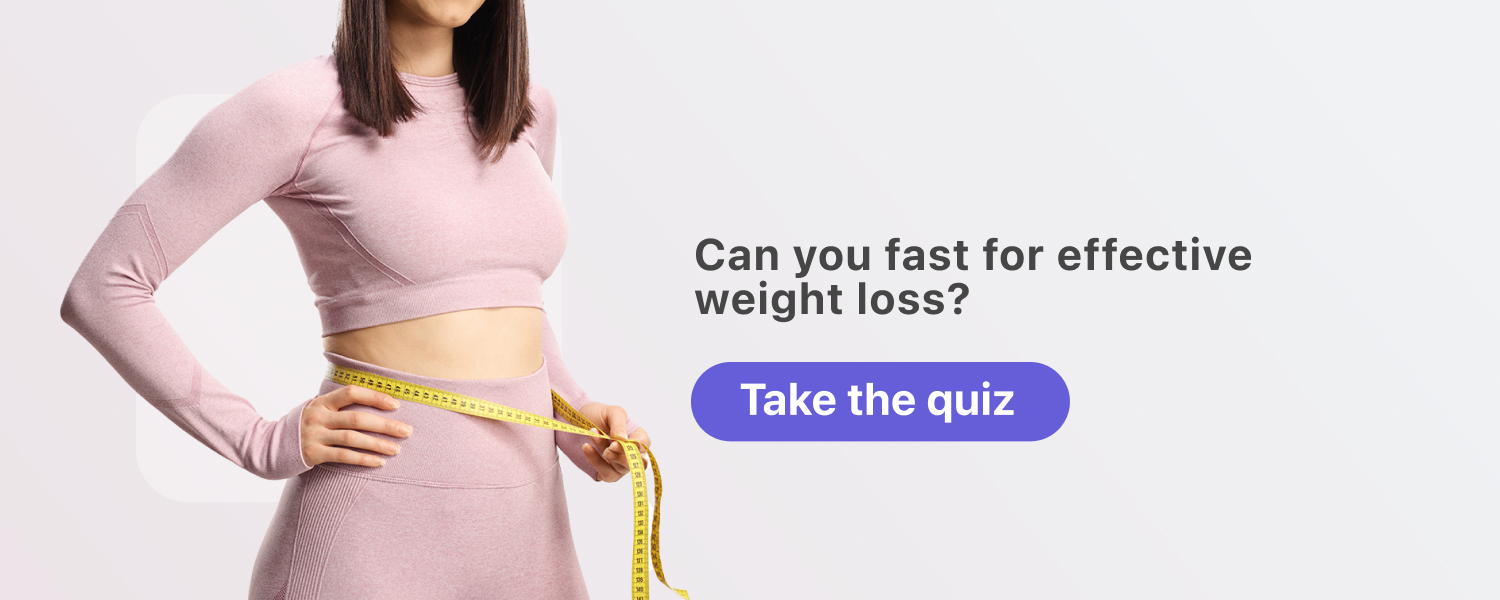Intermittent fasting for women — the complete guide

As a woman trying to look after your health, it can feel like there are a million options you could try.
There are all kinds of hacks. Should you try turmeric shots for extra immunity? Plastic body wraps for fat loss? Green tea for weight loss?
It’s hard to know what’s going to give you the biggest bang for your buck or even what’s real and what’s just internet smoke and mirrors.
One of the newer kids on the block here is intermittent fasting. But does it even work for women?

Can it make you healthier? Leaner? Happier? What difference would it actually make to your body?
We’re going to answer those questions as thoroughly as we can in our Simple intermittent fasting guide for women’s health.

What is intermittent fasting?
Following an intermittent fasting schedule means there are times of the day or week when you intentionally do not eat or drink anything with calories.
You alternate these fasting periods with times when you eat and drink in the usual way.
That’s the emphasis with intermittent fasting: eating for a time, then stopping for a time, in a structured, repetitive way.
There’s no requirement to skip breakfast, count calories, hit macronutrient splits, or align to weird gimmicks like “you may eat only sprouted grains at midnight while wearing bunny slippers and dancing the Macarena.”
That said, getting the full benefit of intermittent fasting does rely on your eating window being packed full of high-quality, healthy, nutritious foods.
(Bookmark these for later: how to meal plan for maximum success and what you can drink while fasting. They’ll come in handy.)
Why intermittent fasting might affect men and women differently
Women can experience intermittent fasting in ways that men don’t because there are differences in how women’s bodies work compared to men’s.
Hormones are an obvious one. How a woman’s body responds to calorie restriction is another.
Intermittent fasting tends to mean we eat less. A shorter eating window naturally leads to a decreased food intake.
For women, a too-severe drop in calories is something the body guards against.
If the body thinks that the food supply could be insufficient, it takes decisive action to either correct the situation (for instance, by increasing hunger signals and prompting people to eat more) or adapt to further starvation (for instance, by allocating fewer resources to non-essential functions like reproduction and recovery).
This helps ensure that we either eat more energy (calories) or use the scarce energy we do have more efficiently.
If calories are pushed too low for too long, there’s a risk of irregular menstrual cycles or amenorrhea — the absence of a menstrual cycle for three months or more — from how this caloric restriction affects the hormones that govern it.These effects don’t necessarily stem from intermittent fasting. It is possible to do it safely. However, they are considerations for women to keep in mind.
Best types of intermittent fasting schedules for women

The best intermittent fasting schedules for women have a more relaxed attitude. They aren’t hardcore or super strict.
Here are our recommendations for bringing a kinder edge to intermittent fasting.
Start gently with TRE
There are three ways you might do this.
- Start with a shorter fasting window like 12:12. Work up to 14:10 and 16:8 if your body feels good.
- Start with what you already do and extend. How long do you currently fast between your last meal of the day and your first meal of the next? That’s your baseline. Simply add an hour and see how it feels.
- Try fasting 2–3 days a week instead of every day. Again, see how your body responds. If all is well, nudge the number of fasting days up slowly.
Don’t start with 5:2 or alternate-day fasting (ADF)
We don’t suggest starting with 5:2 or ADF, as the fast periods are longer and more demanding. This can trigger difficult-to-handle hunger and cravings on eating days.
That doesn’t mean women can never do 5:2 or ADF.
But just like you wouldn’t run a 10K if you hadn’t even seen your sneakers in years, let alone jogged in them, your body will feel more supported starting with a gentler method of intermittent fasting.
Give Eat Stop Eat and water fasting a pass
We don’t recommend these intermittent fasting schedules for women (or anyone, honestly). They’re high-risk and low-benefit. Not a winning combo. How about trying our Simple quiz to get started? You’ll be able to set your fasting schedule exactly how you want and get some practical ideas to support you as you start.
Health benefits of intermittent fasting for women

Let’s fast forward to the future. What kind of benefits could you expect from intermittent fasting?
Heart health
Your heart could get healthier, stronger, and more resilient (physically, that is; emotional resilience is still therapy’s stomping ground).[1]
Intermittent fasting can do all this by:
- reducing blood pressure [2]
- improving triglycerides [2]
- possibly lowering inflammation [3]
- improving cholesterol levels [4]
That’s not a bad haul from something as Simple as time-blocking your food intake, huh!
Reduced diabetes risk
Next up: a lower risk of diabetes from intermittent fasting’s ability to improve your insulin sensitivity.[2,5]
A randomized study showed reductions in fasting insulin and insulin resistance.[2] Still, it’s not a given, as another study found that blood sugar got worse, specifically for women, during a 22-day stint on ADF.[6]
There does appear to be more positive evidence than not, and it may depend on your starting point, but it’s a good reminder to check in with your body to see what’s happening for you.
Appetite control
Intermittent fasting can boost appetite control!? Really?? It’s a fair question — it does seem kinda bizarre that fasting could help us manage hunger, but science suggests it could.[7]
As always, see how it works for you. How do your hunger cues respond?
Reduced body fat
Intermittent fasting could offer a helping hand on the road to fat loss,[8] particularly belly fat loss,[4] a welcome benefit if reshaping your body is a goal.
(Curious about how to burn fat or the difference between fat loss vs. weight loss? We gotcha covered.)
Improved PCOS symptoms
A 2021 study suggests that intermittent fasting is good for women with PCOS.[9] Over six weeks, a TRE approach reduced body fat and improved menstruation, hyperandrogenemia, insulin resistance, and chronic inflammation.
We need both longer and more studies, but this is promising stuff. If this is relevant to you, tune in to your experience. What do you notice?
Health risks of intermittent fasting for women
Of course, intermittent fasting has some risks for women’s health and well-being, too.
Bone strength and density
Some research suggests that significantly limiting calorie intake may lead to reduced bone strength and density.[10] That said, one study showed that six months of ADF had no effect on bone health.[11]
Any potential impact on bone health is one reason why choosing a fasting method that doesn’t make it impossible to get enough energy and nutrients is important. You gotta get sufficient vitamin D- and calcium-rich foods (for instance) to take care of dem bones!
The grumps (and other short-term pains)
When you’re new to it, intermittent fasting has side effects, like increased hunger, brain fog, tiredness, disrupted sleep, and headaches.
Also in the mix here: the grumps. As you get used to fasting, your mood might nosedive.
All this will pass, though. Double down on self-care during your first couple of weeks of intermittent fasting — it’ll help.
Hormonal disruption
Women’s bodies experience prolonged caloric restriction as a stressor. If your life already has plenty of those (and whose doesn’t these days?), going too hard with your intermittent fasting efforts can tip the balance into a negative place.
Persistent undereating can interfere with your menstrual cycle and fertility. Cortisol levels can also rise, which can cause effects like dysregulated blood sugar, insulin resistance, muscle loss, increased fatigue, and so on.
Intermittent fasting should be something that builds you up rather than breaks you down. Go easy with it and aim to make it a nourishing part of your life, not another stressor.
Disordered eating
Food rules and restrictions can really mess with us and lead to disordered eating behaviors like binging, becoming obsessed with food, or restricting too hard and not fueling yourself well enough.
If intermittent fasting starts to play out like that for you, leave it behind. Your mental and emotional health is too important to mess with.
How effective is intermittent fasting in weight loss for women?

Can intermittent fasting be effective for weight loss in women?
The evidence suggests it can. In a 2020 study, women followed a 16:8 intermittent fasting schedule for six weeks and lost about 4.5 lbs of body weight on average.[12]
Whether it’s better than traditional calorie-restricted diets is unclear, though. Studies suggest that intermittent fasting is on par with those in terms of weight loss results for women.[2]
Whether it’s better for you is something only you can determine. Some women who struggle with simply trying to reduce calories on a regular eating pattern get on great with intermittent fasting.
What they say is true — the weight loss plan you can stick to long term is the one that’ll work best for you.
Is intermittent fasting safe for women?
Intermittent fasting can be safe for women, but there are some points to pay attention to.
We’ve already covered how crucial it is not to over-restrict calories or fast too long.
Another consideration is that our need for nutrients increases as we age (yet our appetite may decrease, making that an already challenging thing).
The more restrictive intermittent fasting schedules, like Eat Stop Eat, can easily lead to nutrient deficiencies, which can be a real problem. For instance, a lack of calcium can turn a fall into a bone-fracturing event. That kind of injury is associated with a pretty high mortality rate.
Add to that the fact that some women may lose muscle mass through intermittent fasting.
Although some studies show that intermittent fasting can help preserve muscle mass,[11] other studies suggest that lean mass may decrease.[13]
That’s key for weight management because the more muscle you have, the more calories you burn for every activity you do. It also matters more as we age, as it’s far easier to fall and hurt yourself when you don’t have a lot of muscle on your frame.
Again, as the data is mixed, this is something to pay attention to if you decide to try intermittent fasting.
Women who should avoid intermittent fasting
While intermittent fasting is broadly safe and healthy for women, there are some who shouldn’t try it unless they have the express permission and support of their doctor.
That’s you if you:
- are pregnant, breastfeeding, or trying to conceive
- are under a lot of stress
- are under 18 or 80 years or older
- have nutritional deficiencies
- have a body mass index (BMI) in the “underweight” category
- are very active and/or have high daily energy demands
- have (or are at risk of having) an eating disorder or have a history of one
- take medications (especially those that affect blood glucose or blood pressure levels)
- have a health condition, like diabetes or anemia
How to get started with intermittent fasting
Intermittent fasting for beginners doesn’t need to be complex. A couple of Simple things can get you started real easy.
Know what you want
What do you hope to achieve from intermittent fasting?
Before you start, get clear on that. Spend some time thinking through your goals.
If you’re feeling creative, break out some colored pens and draw them out. Heck, why not get some papier-mâché going? Make a model of your dreams. Get messy with it.
On the days you feel like quitting, that image (or model, or fully choreographed dance routine, whatever floats your boat) will keep you going.
Build a fasting schedule that works for you
Use everything you’ve learned here — and what you know about yourself and your lifestyle — to create a fasting schedule that works for you.
For instance:
- Are you normally hungry in the mornings or the evenings? Factor that into your eating window.
- When do you work out? Sync that with your eating window so you can replenish your energy.
- Take a break around your period if fasting feels harder during those days.
You’re in control here.
5 tips for women getting into intermittent fasting

- Don’t go at it alone
Talk to your people. Who will cheer you on, fill your water bottle for you when you can’t be bothered, or give you a cuddle on a rough day?
One option you always have — us.
At Simple, we love intermittent fasting, and we know what it’s like to start out. If you want us in your corner, take our quiz. We’ll get you on your way and stick around for the journey.
Intermittent fasting can be challenging to do consistently. Support is key.
- Drink enough water
Hunger will show up. One of the best ways to deal with it is to hydrate well. Water can stave off hunger pangs and increase feelings of fullness.
Not just that, though — drinking water will also steer you away from dehydration, which can be a real risk of intermittent fasting.
- Listen to your body
If you constantly feel hungry and that makes you miserable …
If your body feels “off,” sluggish, or out of sorts …
If your health markers take a downward turn …
… intermittent fasting isn’t your bag. (And that’s OK.)
On the other hand, if fasting makes you feel bouncy, happy, and mentally sharp, it’s working well.
- Eat good food
When you fast, no calories shall pass your lips.
But when you eat, eat like a queen.
Healthy eating doesn’t have to be a drab, boring affair. It can be a way you can love hard on your body.
We’ve put everything you need to know about what to eat during intermittent fasting here, but the TL;DR version is this:
Eat a diet rich in whole foods, lean protein, whole grains, veggies, fruits, healthy fats, and calcium, and find ways to enjoy these foods.
You gotta like what you eat if you’re gonna do it every day. How could you ramp up the joy factor in what you eat?
Don’t think you need to be perfect in this, either. Yes, making healthy choices most of the time is important. But so is leaving a little room for muffins, cheesecake, and chips.
- Make sure intermittent fasting is YOUR idea
Here’s a fact about food rules: if they’re not yours, you won’t follow them. If you choose to fast, do it for you and do it your way.
Some studies show a woman can lose between 3% and 8% of her body weight over 3 to 24 weeks when intermittent fasting.[5]
Intermittent fasting is good for women so long as they approach it with care.
The best intermittent fasting schedule for women is a) the one they can stick to and b) the one that works with their body.
The evidence seems to show that, no, intermittent fasting does not slow metabolism.

- Malinowski B, Zalewska K, Węsierska A, Sokołowska MM, Socha M, Liczner G, et al. Intermittent Fasting in Cardiovascular Disorders-An Overview. Nutrients [Internet]. 2019 Mar 20;11(3).
- Harvie MN, Pegington M, Mattson MP, Frystyk J, Dillon B, Evans G, et al. The effects of intermittent or continuous energy restriction on weight loss and metabolic disease risk markers: a randomized trial in young overweight women. Int J Obes . 2011 May;35(5):714–27.
- Aksungar FB, Topkaya AE, Akyildiz M. Interleukin-6, C-reactive protein and biochemical parameters during prolonged intermittent fasting. Ann Nutr Metab. 2007 Mar 19;51(1):88–95.
- Klempel MC, Kroeger CM, Bhutani S, Trepanowski JF, Varady KA. Intermittent fasting combined with calorie restriction is effective for weight loss and cardio-protection in obese women. Nutr J. 2012 Nov 21;11:98.
- Barnosky AR, Hoddy KK, Unterman TG, Varady KA. Intermittent fasting vs daily calorie restriction for type 2 diabetes prevention: a review of human findings. Transl Res. 2014 Oct;164(4):302–11.
- Heilbronn LK, Civitarese AE, Bogacka I, Smith SR, Hulver M, Ravussin E. Glucose tolerance and skeletal muscle gene expression in response to alternate day fasting. Obes Res. 2005 Mar;13(3):574–81.
- Beaulieu K, Casanova N, Oustric P, Turicchi J, Gibbons C, Hopkins M, et al. Matched Weight Loss Through Intermittent or Continuous Energy Restriction Does Not Lead To Compensatory Increases in Appetite and Eating Behavior in a Randomized Controlled Trial in Women with Overweight and Obesity. J Nutr. 2020 Mar 1;150(3):623–33.
- Martínez-Rodríguez A, Rubio-Arias JA, García-De Frutos JM, Vicente-Martínez M, Gunnarsson TP. Effect of High-Intensity Interval Training and Intermittent Fasting on Body Composition and Physical Performance in Active Women. Int J Environ Res Public Health [Internet]. 2021 Jun 14;18(12).
- Li C, Xing C, Zhang J, Zhao H, Shi W, He B. Eight-hour time-restricted feeding improves endocrine and metabolic profiles in women with anovulatory polycystic ovary syndrome. J Transl Med. 2021 Apr 13;19(1):148.
- Hisatomi Y, Kugino K. Changes in bone density and bone quality caused by single fasting for 96 hours in rats. PeerJ. 2019 Jan 9;6:e6161.
- Barnosky A, Kroeger CM, Trepanowski JF, Klempel MC, Bhutani S, Hoddy KK, et al. Effect of alternate day fasting on markers of bone metabolism: An exploratory analysis of a 6-month randomized controlled trial. Nutr Healthy Aging. 2017 Dec 7;4(3):255–63.
- Domaszewski P, Konieczny M, Pakosz P, Bączkowicz D, Sadowska-Krępa E. Effect of a Six-Week Intermittent Fasting Intervention Program on the Composition of the Human Body in Women over 60 Years of Age. Int J Environ Res Public Health [Internet]. 2020 Jun 10;17(11).
- Cienfuegos S, Gabel K, Kalam F, Ezpeleta M, Lin S, Varady KA. Changes in body weight and metabolic risk during time restricted feeding in premenopausal versus postmenopausal women. Exp Gerontol. 2021 Oct 15;154:111545.
